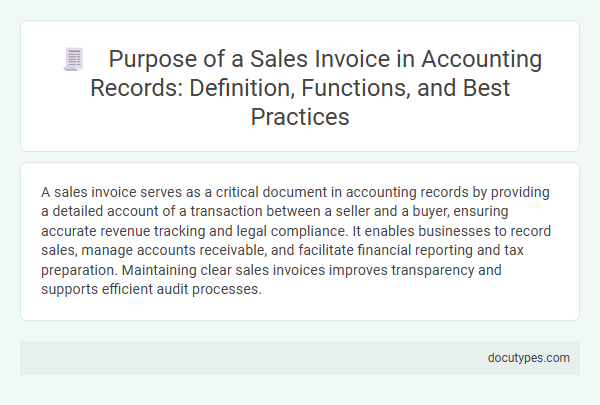A sales invoice serves as a critical document in accounting records by providing a detailed account of a transaction between a seller and a buyer, ensuring accurate revenue tracking and legal compliance. It enables businesses to record sales, manage accounts receivable, and facilitate financial reporting and tax preparation. Maintaining clear sales invoices improves transparency and supports efficient audit processes.
Introduction to Sales Invoices in Accounting
A sales invoice is a critical document in accounting records that details a transaction between a seller and a buyer. It serves as proof of sale, outlining the products or services provided, quantities, prices, and payment terms. Your business relies on sales invoices to track revenue, manage accounts receivable, and maintain accurate financial statements.
Defining a Sales Invoice: Key Elements
A sales invoice serves as a crucial document in accounting records that details a transaction between a seller and a buyer. Your accounting accuracy relies on the clear presentation of all key elements within the sales invoice.
- Invoice Number - A unique identifier for tracking and referencing the transaction in accounting systems.
- Seller and Buyer Information - Includes names, addresses, and contact details to establish parties involved.
- Itemized List of Goods or Services - Specifies quantities, descriptions, unit prices, and totals to record the sale accurately.
Primary Purpose of a Sales Invoice in Accounting
| Aspect | Description |
|---|---|
| Primary Purpose | Document the sale transaction between a business and its customer, serving as official proof of goods or services delivered and amounts owed. |
| Role in Accounting | Acts as a source document for recording revenue, ensuring accurate sales reporting in financial records and supporting accounts receivable management. |
| Legal Importance | Provides evidence of a contract and terms of sale, which can be used in compliance audits and dispute resolution. |
| Content | Includes essential information such as seller and buyer details, description of goods or services, pricing, quantities, payment terms, and invoice date. |
| Impact on Financial Statements | Directly influences revenue recognition on income statements and accounts receivable balances on balance sheets, reflecting the company's financial health. |
Legal and Compliance Roles of Sales Invoices
A sales invoice serves as a legal document that records a transaction between a buyer and a seller. It provides proof of the sale and details necessary for accounting and tax purposes.
Your sales invoice ensures compliance with tax laws by documenting the amount of sales tax collected and paid. It supports audit trails, helping businesses meet regulatory requirements and avoid penalties. Accurate sales invoices also protect your business in legal disputes by establishing clear records of sales agreements.
Functions of Sales Invoices in Financial Recordkeeping
A sales invoice serves as a formal document that records the details of a transaction between a seller and a buyer. It provides essential information such as the date of sale, item descriptions, quantities, prices, and total amounts due.
Sales invoices function as critical evidence in financial recordkeeping, ensuring accuracy in accounts receivable and revenue tracking. They facilitate audit trails, support tax reporting, and help maintain compliance with accounting standards.
Importance of Sales Invoices for Audit Trails
A sales invoice serves as a crucial document in accounting records, providing detailed evidence of transactions between a seller and a buyer. It establishes an official audit trail, ensuring transparency and accuracy in financial reporting. Your sales invoices help auditors verify the legitimacy of revenue and expenses during financial reviews and compliance checks.
Enhancing Business Cash Flow with Accurate Sales Invoices
What is the purpose of a sales invoice in accounting records? A sales invoice documents the sale of goods or services, providing a clear record for both the seller and buyer. Accurate sales invoices enhance business cash flow by ensuring timely payments and minimizing errors in financial tracking.
Best Practices for Creating and Managing Sales Invoices
A sales invoice serves as a critical document in accounting records, detailing the products or services sold and the payment terms. It ensures accurate tracking of revenue and supports financial transparency within a business.
- Clear Itemization - List each product or service with descriptions, quantities, and prices to avoid disputes and maintain clarity.
- Consistent Numbering - Use a sequential invoice numbering system for easy reference and audit trails.
- Timely Delivery - Send invoices promptly after the sale to accelerate payment and improve cash flow.
Implementing these best practices helps your accounting remain precise and supports efficient financial management.
Common Mistakes to Avoid in Sales Invoice Documentation
The purpose of a sales invoice in accounting records is to document a transaction, providing a clear record for both the seller and buyer. Accurate sales invoice documentation ensures proper financial tracking and compliance with tax regulations.
- Inaccurate Invoice Details - Errors in customer information, product descriptions, or amounts can lead to payment delays and accounting discrepancies.
- Omitting Mandatory Elements - Missing invoice number, date, or tax information may cause legal issues and complications in auditing.
- Failure to Verify Data - Neglecting to review invoices before sending can result in disputes and loss of trust with clients.
What Is the Purpose of a Sales Invoice in Accounting Records? Infographic

